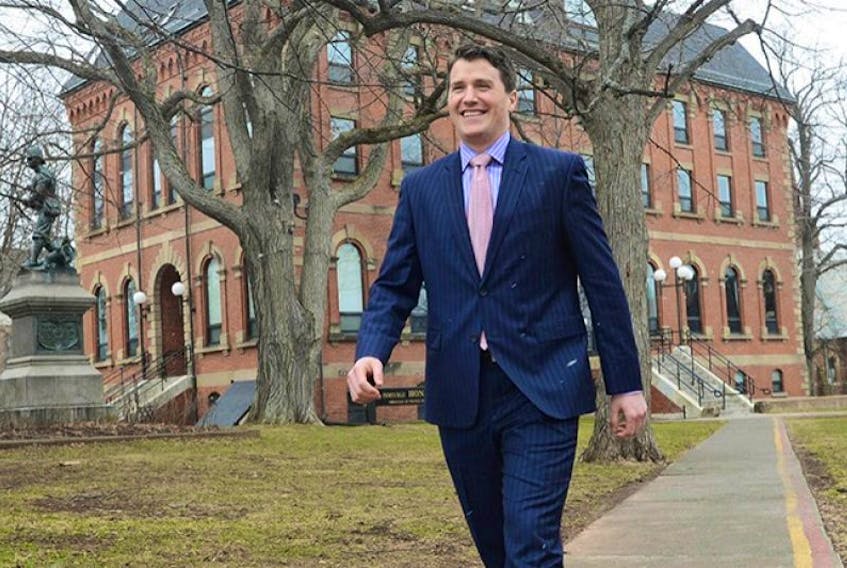Prince Edward Island will hold a plebiscite on electoral reform this fall, but Islanders will have a lot of homework to do before casting their ballots.
The committee of MLAs tasked with forming a plebiscite question delivered its report to the P.E.I. legislature Friday.
The Special Committee on Democratic Renewal has recommended a multi-option ballot offering five different choices for voting systems.
The five options are:
- Duel member mixed proportional representation
- First-past-the-post (the current system)
- First-past-the-post plus leaders
- Mixed member proportional representation
- Preferential voting
The committee has also recommended Islanders use a ranked ballot to choose among these options for the plebiscite vote.
CLICK HERE TO READ THE FULL COMMITTEE REPORT
RELATED: Islanders to vote on electoral reform in 2016
Committee chairman Jordan Brown says the committee debated for many hours about how the plebiscite question should be worded and how many options to offer.
In the end, it was decided by consensus that Islanders should be left to decide among the five themes that emerged from the public consultations held in the fall of 2015 and through February and March of this year.
“The five options that are there we think fairly represents what Islanders portrayed to us as their desires over the course of the consultations throughout the fall and winter,” Brown said.
“We did our utmost to canvass different possibilities, and there are pros and cons to every system we have heard about … we have chosen a representative subset that Islanders can then go through and make selections based on what their desires are.”
The first-past-the-post plus leaders option would see party leaders given a seat in the P.E.I. legislature if their party achieves at least 10 per cent of the popular vote in a general election.
For the mixed member proportional representation option, open lists of candidates would be incorporated, offering voters a degree of choice by way of party lists.
The “top up seats” made up of candidates from these open lists would make up one third of the total number of seats in the P.E.I. legislature.
The dual member mixed proportional representation system is a new model developed by Sean Graham, a researcher at the University of Alberta. It would see the number of ridings reduced to 14, with two members for each riding. The candidate who achieves the majority of votes in each riding wins the first seat and the second is allocated to the best performing candidates who may not have won the majority of votes but whose party is allocated seats based on the percentage of the popular vote the party achieves overall.
Preferential voting is relatively new to P.E.I., having only ever been used in Liberal and Conservative party conventions for choosing a leader or candidate.
In this case, Islanders will be using a preferential ballot to rank the options for electoral reform in order of preference, from one to five. Curiously, one of the five options is, in fact, moving to a preferential ballot for general elections.
Brown admits this multi-option ballot with new and unfamiliar options does mean more research will be necessary for Islanders to choose whether they want to keep the status quo or choose a new voting system.
He and the other four MLAs on the tri-partisan committee agreed they believe Islanders, who consistently vote in greater numbers than any other jurisdiction in the country, are up to the task.
“I do have faith in Islanders that they will be able to understand all of these different systems to a degree that they will be able to make an informed choice,” said Green Party Leader and committee member Peter Bevan-Baker.
“The education process is going to be critical, of course. And I think you will see a very vigourous campaign here.”
The committee is also recommending the plebiscite use electronic voting to maximize access, as long as privacy, security and accuracy can be assured.
It has also been suggested the voting age for the plebiscite should be lowered to 16.
Elections P.E.I. will be tasked with mounting an education campaign to ensure voters across the province receive clear and impartial information.
The committee’s recommendations will be debated in the P.E.I. legislature, which could see a change in the proposed plebiscite question.
P.E.I.’s plebiscite on electoral reform will be held in November.
Prince Edward Island will hold a plebiscite on electoral reform this fall, but Islanders will have a lot of homework to do before casting their ballots.
The committee of MLAs tasked with forming a plebiscite question delivered its report to the P.E.I. legislature Friday.
The Special Committee on Democratic Renewal has recommended a multi-option ballot offering five different choices for voting systems.
The five options are:
- Duel member mixed proportional representation
- First-past-the-post (the current system)
- First-past-the-post plus leaders
- Mixed member proportional representation
- Preferential voting
The committee has also recommended Islanders use a ranked ballot to choose among these options for the plebiscite vote.
CLICK HERE TO READ THE FULL COMMITTEE REPORT
RELATED: Islanders to vote on electoral reform in 2016
Committee chairman Jordan Brown says the committee debated for many hours about how the plebiscite question should be worded and how many options to offer.
In the end, it was decided by consensus that Islanders should be left to decide among the five themes that emerged from the public consultations held in the fall of 2015 and through February and March of this year.
“The five options that are there we think fairly represents what Islanders portrayed to us as their desires over the course of the consultations throughout the fall and winter,” Brown said.
“We did our utmost to canvass different possibilities, and there are pros and cons to every system we have heard about … we have chosen a representative subset that Islanders can then go through and make selections based on what their desires are.”
The first-past-the-post plus leaders option would see party leaders given a seat in the P.E.I. legislature if their party achieves at least 10 per cent of the popular vote in a general election.
For the mixed member proportional representation option, open lists of candidates would be incorporated, offering voters a degree of choice by way of party lists.
The “top up seats” made up of candidates from these open lists would make up one third of the total number of seats in the P.E.I. legislature.
The dual member mixed proportional representation system is a new model developed by Sean Graham, a researcher at the University of Alberta. It would see the number of ridings reduced to 14, with two members for each riding. The candidate who achieves the majority of votes in each riding wins the first seat and the second is allocated to the best performing candidates who may not have won the majority of votes but whose party is allocated seats based on the percentage of the popular vote the party achieves overall.
Preferential voting is relatively new to P.E.I., having only ever been used in Liberal and Conservative party conventions for choosing a leader or candidate.
In this case, Islanders will be using a preferential ballot to rank the options for electoral reform in order of preference, from one to five. Curiously, one of the five options is, in fact, moving to a preferential ballot for general elections.
Brown admits this multi-option ballot with new and unfamiliar options does mean more research will be necessary for Islanders to choose whether they want to keep the status quo or choose a new voting system.
He and the other four MLAs on the tri-partisan committee agreed they believe Islanders, who consistently vote in greater numbers than any other jurisdiction in the country, are up to the task.
“I do have faith in Islanders that they will be able to understand all of these different systems to a degree that they will be able to make an informed choice,” said Green Party Leader and committee member Peter Bevan-Baker.
“The education process is going to be critical, of course. And I think you will see a very vigourous campaign here.”
The committee is also recommending the plebiscite use electronic voting to maximize access, as long as privacy, security and accuracy can be assured.
It has also been suggested the voting age for the plebiscite should be lowered to 16.
Elections P.E.I. will be tasked with mounting an education campaign to ensure voters across the province receive clear and impartial information.
The committee’s recommendations will be debated in the P.E.I. legislature, which could see a change in the proposed plebiscite question.
P.E.I.’s plebiscite on electoral reform will be held in November.









